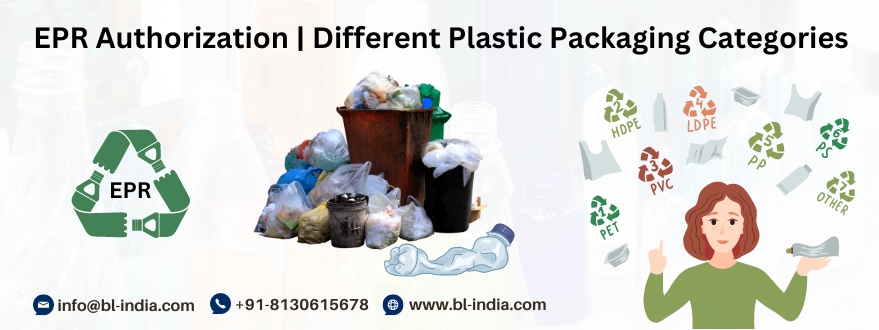
Plastic pollution has emerged as a pressing environmental challenge globally, and India is no exception. In response to this issue, the concept of Extended Producer Responsibility (EPR) has gained prominence as a crucial policy tool.
Extended Producer Responsibility places the onus on producers to manage the lifecycle of their products, especially concerning disposal and recycling. In India, plastic packaging constitutes a significant portion of the plastic waste generated, prompting the government to introduce EPR regulations tailored for different plastic packaging categories.
In this blog, we will discover the nuances of EPR Registration for plastic waste covering various plastic packaging categories in India and its significance in addressing plastic waste management.
EPR Registration for plastic waste in India is a pivotal aspect of the country's efforts to tackle plastic pollution. The Ministry of Environment, Forest and Climate Change has issued comprehensive guidelines on Extended Producer Responsibility under the Plastic Waste Management Rules, 2016.
These guidelines, coupled with the prohibition of specific single-use plastic items notorious for their low utility and high littering potential from July 1, 2022, mark crucial steps towards mitigating the pollution caused by discarded plastic waste across the nation. The framework provided by the guidelines aims to bolster the circular economy of plastic packaging waste, foster the development of alternative materials to plastics, and chart a course towards sustainable plastic packaging practices by businesses.
Mandates within the guidelines include the promotion of the reuse of rigid plastic packaging materials to curtail the consumption of fresh plastic and the setting of minimum recycling levels for plastic packaging waste collected under EPR, along with the utilization of recycled plastic content, which collectively work towards reducing plastic consumption and bolstering plastic packaging waste recycling efforts.
The implementation of EPR guidelines is poised to catalyze the formalization and advancement of the plastic waste management sector. These guidelines include the provision for the sale and purchase of surplus Extended Producer Responsibility certificates, establishing a market mechanism for plastic waste management—a significant first in the country's endeavor towards sustainable waste management practices.
The operationalization of EPR is facilitated through a tailored online platform serving as the digital backbone of the system. This platform facilitates the tracking and monitoring of EPR obligations, streamlines the registration process, and enables the filing of annual returns, thereby alleviating the compliance burden for companies.
EPR mandates producers, importers, and brand owners to take responsibility for managing the lifecycle of their products, ensuring that plastic packaging is recycled, reused, or disposed of properly, contributing to the reduction of the environmental footprint of plastic waste and fostering a circular economy ethos. The EPR registration process, overseen by the Central Pollution Control Board (CPCB), underscores the commitment of these entities to meet their EPR targets and adhere to the stipulations laid out in the Plastic Waste Management Rules.
The guidelines for Extended Producer Responsibility for plastic packaging in India encompass several key provisions outlined within the regulatory framework:
Under the Extended Producer Responsibility framework, several categories of plastic packaging fall within its scope, including:
Category I: Rigid plastic packaging
Category II: Single-layer or multilayer flexible plastic packaging, plastic sheets, carry bags, sachets, or pouches
Category III: Multi-layered plastic packaging with at least one layer of material other than plastic
Category IV: Plastic sheets and compostable plastic carry bags
Producers, importers, and brand owners utilizing any of these types of plastic packaging are required to register for EPR and meet their respective responsibilities as per the regulations.
EPR registration for plastic waste management holds significant importance for producers, importers, and brand owners due to several reasons:
Upon registering for Extended Producer Responsibility, producers, importers, and brand owners (PIBOs) in India are entrusted with specific duties and obligations, which include:
By fulfilling these responsibilities, producers, importers, and brand owners play a pivotal role in the effective management of plastic waste and the attainment of EPR targets, thereby contributing to environmental sustainability and resource conservation.
To complete the EPR Certification process for plastic waste management, several essential documents are required. These include:
To obtain EPR Authorization for plastic waste management, follow these steps:
Step 1: Begin by registering on the centralized EPR portal developed by the CPCB. This registration grants access to the application form and provides necessary login credentials.
Step 2: Log in to the portal and complete the application form, ensuring all required information is provided. Separate application forms are available for producers, importers, and brand owners. Upload relevant documents as per the specified requirements.
Step 3: Alongside the application, submit the requisite application fee. Utilize the integrated payment gateway on the portal for convenient online payment processing.
Step 4: Applications from entities operating in one or two states are forwarded to the respective State Pollution Control Boards for further processing. For entities operating in more than two states, the CPCB manages the application processing.
Step 5: Authorized officials review the submitted application for completeness and accuracy. Upon successful verification, the CPCB or SPCB issues the EPR registration certificate, featuring a digital signature integrated into the portal.
In conclusion, navigating the intricacies of EPR Registration for different plastic packaging categories in India is a crucial step towards sustainable waste management practices. As plastic pollution continues to pose significant environmental challenges, it becomes imperative for producers, importers, and brand owners to fulfill their EPR obligations effectively.
In this endeavour, Brand Liaison, a trusted partner specializing in regulatory compliance, plays a pivotal role in assisting businesses to obtain EPR Authorization seamlessly.
By leveraging our expertise and experience, we facilitate the EPR registration process, ensuring that companies adhere to regulatory requirements and streamline their compliance efforts.